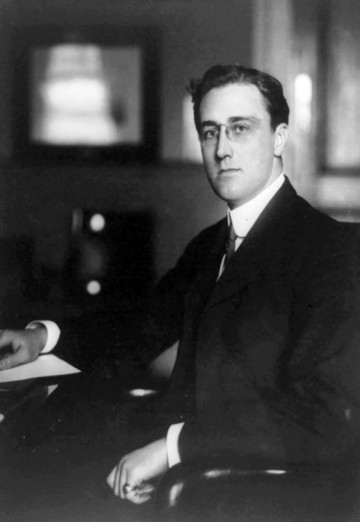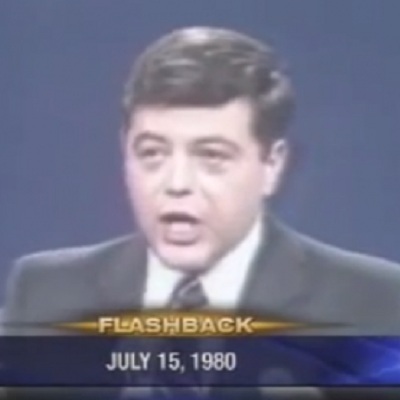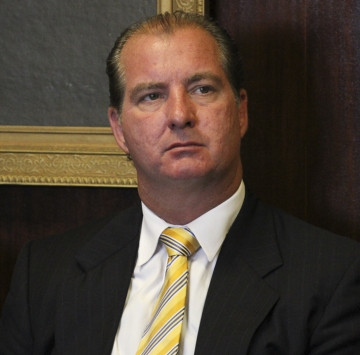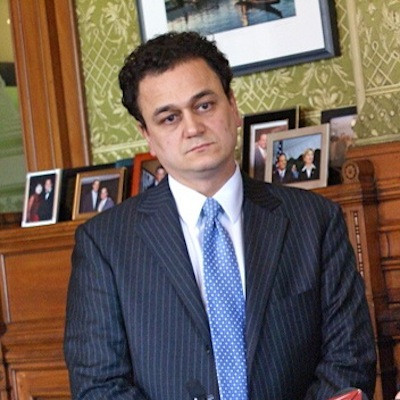FDR’s Dark Anti-Gay Legacy in Newport
Monday, September 29, 2014
The Roosevelts are all the buzz with the launch of Ken Burns' new PBS documentary, but one of the darkest episodes in Franklin Roosevelt's career was in Newport, RI and was ignored by Burns.
In the spring of 1919, Assistant Secretary of the Navy Franklin D. Roosevelt and his fellow officers at the Newport, Rhode Island Naval Training Station recruited enlisted sailors to investigate what they called "immoral conditions"-- homosexual activity -- in Newport through the use of entrapment. The decoys were ordered to have sex with "sexual perverts" in the community, resulting in the arrest of more than 20 sailors and 16 civilians including a prominent Episcopal Navy clergyman, Samuel Kent.
Roosevelt's involvement in the investigation -- which a 1921 report by the Senate Naval Affairs Committee called "reprehensible" and as having "violated the code of the American citizen and ignored the rights of every American boy who enlisted in the navy to fight for his country" -- has been largely wiped clean from the history books, and there was no mention of it in Ken Burns' new documentary series on PBS The Roosevelts: An Intimate History.
GET THE LATEST BREAKING NEWS HERE -- SIGN UP FOR GOLOCAL FREE DAILY EBLAST"It is pretty appalling that the 1919 investigation does not get mentioned in The Roosevelts," said Pulitzer Prize winning historian John Loughery, whose 1998 book The Other Side of Silence: Men's Lives and Gay Identities: A Twentieth Century History opens with a detailed account of the 1919 scandal in Newport.
The Forgotten Scandal in FDR's Legacy
"The fact that it didn't strike Roosevelt as strange to send sailors out to have sex with men in Newport as decoys says something about his leadership, and is a significant part of his story," said Loughery.
"Very few people today even know about the scandal, and most biographical works about FDR either fail to mention it all or gloss over his role as a leader of the investigation," said Loughery. "When I watched the program I was prepared to be pleasantly surprised when Ken Burns brought it up, and my sense is that Burns decided to leave it out because it doesn't fit in with the mythologizing and hero dimension."
Joseph Keefe, historian at the National Archives Regional Depository in Waltham, Massachusetts, offered a similar vantage point regarding the historical significance of the Newport investigation in the context of Roosevelt's legacy.
"They say history is written by the victors and it's true in the context of Franklin D. Roosevelt's career and his legacy. There are times when even the greatest people have failings, and for him the Newport Scandal of 1919 was one of them," said Keefe.
According to Keefe, Roosevelt's role in the scandal was driven by his own political aspirations.
"When you step back and look at what happened in 1919 from a historical context, the investigation was really an opportunity for Roosevelt to one-up Secretary of the Navy Josephus Daniels, and he viewed it as a way of making a score in the eyes of the navy and America and people of his own class," said Keefe. "It was widely known that Roosevelt had little respect for Daniels, and wanted his job. Newport was chosen for a reason. He could have gone to any naval base in America, but Newport represented the class that Franklin Roosevelt came from."
According to Loughery, Roosevelt's involvement speaks to his mindset regarding homosexuality which changed over time.
"I don't think that FDR himself was homophobic. It is clear that he was not later in life as evidenced by his accepting Eleanor's relationships with lesbian women and his friendship with Sumner Welles, well-known to be homosexual -- who also served in his Administration. But what happened in Newport is an important part of his story and Burns had a responsibility to include the fact that he was in charge of this entrapment, at the time he was appalled to discover that navy sailors were engaging in homosexual activity at the time, and that his opinion about homosexuality changed over time," said Loughery.
The ProJo, the Clergy, and the United States Senate
20 year veteran of the LGBT movement in Rhode Island Kate Monteiro spoke to the significance of the 1919 investigation, which she argues lies not in the tactics employed in the investigation, but in the amount of historical documentation the trials provided regarding gay life and culture in Newport at that time.
"The 1919 investigation is a complex moment for Rhode Island, but was it a dark period in Rhode Island history? No it was not," said Monteiro."There was a flourishing of underground gay male culture in Newport in the teens, and if you read the testimonials from the trials, there was a wealth of information about this period of history."
"It was not the Navy starting a Witch Hunt as some have made it out to be. Entrapment had been going on for hundreds of years and sodomy charges were nothing new. Roosevelt and the Navy were censured not for going after gay people. They were censured because of the perception that they were asking ‘innocent’ straight sailors to go undercover," Monteiro added.
"The interesting thing is that the Republicans who led the Senate investigation didn't attack Roosevelt in the report for going after homosexuals. The Republicans who controlled the Senate Committee on Naval Affairs and they weren't necessarily questioning why this was being investigated, but rather the tactics being used," said Keefe. "I think this speaks to what America was like in 1919. Going after homosexuals was not a problem. These people had no rights and if people wanted to just meet up they had to do so in secret."
Indeed, the investigation received little attention at the time until the Providence Journal and the Episcopal Church got involved, according to an excerpt written by Yale historian George Chauncey, PhD, widely considered to be the preeminent expert on the Newport scandal in Sexual Borderlands: Constructing An American Sexual Past. Chauncey writes:
"The entire investigation received little attention before the navy accused a prominent Episcopal clergyman who worked at the YMCA of soliciting homosexual contacts there. But when civilian and naval officials took the minister to trial on charges of being a 'lewd and wanton person' a major controversy developed. Protests by the Newport Ministerial Union and the Episcopal Bishop of Rhode Island, and a vigorous editorial campaign by the Providence Journal, forced the navy to conduct a second inquiry in 1920 into the methods used in the investigation. When that inquiry criticized the methods but essentially exonerated the senior naval officials who had instituted them, the ministers asked the Republican-controlled Senate Naval Affairs Committee to conduct its own investigation. The committee agreed and issues its own report in 1921 that vindicated the ministers' original charges and condemned the conduct of the highest naval officials involved, including Franklin D. Roosevelt, President Wilson's assistant secretary of the navy and the 1920 vice presidential candidate."
According to Keefe, the Providence Journal's motivations for getting involved had more to do with politics than outrage at immoral tactics, and it was the Episcopal Church that brought the tactics being used to light.
"The religious community were the ones who really brought it out in the light and exposed the navy on the kind of tactics being used. Unlike today, the Providence Journal was a conservative Republican paper at the time. While Roosevelt was not really that well known at the time, I think they saw it as an opportunity to embarrass Woodrow Wilson," said Keefe.
Evolution of Gay Rights in the Navy
"The 1919 investigation is an important moment for historians but as a practical insight into the military today there are much more important issues – Don’t Ask Don’t Tell and the legacy of the Cold War," said Monteiro. "During the Cold War when there was a manpower shortage gays served in the military as openly as one can imagine but they weren’t getting kicked out for being gay. It wasn’t until the Cold War and the Red Scare that the military started cracking down saying it was a security risk. Pre Cold War it was sodomy is bad, your action is illegal. During the Cold War it became homosexuality is akin to Communism your existence is a decedent to the country. Don’t Ask Don’t Tell was the solution, a compromise they came up with in the 90s that one couldn't be a security risk if no one knew they were gay."
"Clearly there have been huge strides made in the last 4-5 years. The elimination of Don't Ask Don't Tell has been pretty well implemented with little to no disruption within the ranks. Indeed, the command has been quite enthusiastic about saying 'this is a new military' so on the whole the picture is much much better," said Monteiro.
LTJG Joe Keiley Public Affairs Officer and Chief of Naval Personnel spoke to the process leading up to the repeal of Don't As Don't Tell.
"In May 2010, the Secretary of Defense established the Comprehensive Review Working Group (CRWG) to assess the implications of repealing section 654, Title 10 U.S. Code, the law known as Don't Ask, Don't Tell (DADT)," said Keiley. "As part of that review a survey was conducted to get the opinion of the force on repeal of DADT. The DOD recognized that gay and lesbian Sailors were already serving in our ranks. The survey results show that close to 80 percent of participants had served with a gay or lesbian Sailor without negative impacts to cohesion, effectiveness, or morale."
Spokespeople from both the United States Navy in Annapolis and United States Naval War College in Newport emphasized their commitment to ensuring equality for all.
"As the Navy stands today, all Sailors, regardless of sexual orientation, are entitled to an environment free from personal, social, or institutional barriers that prevent service members from rising to the highest level of responsibility possible" said Keiley.
"The Naval War College remains committed to ensuring that all men and women who serve in the U.S. military, and their families, are treated fairly and equally as the law directs," said Daniel S. Marciniak from the U.S. Naval War College Public Affairs.
Related Slideshow: Rhode Island Biggest Political Scandals
Related Articles
- Gay Marriage in Rhode Island: GoLocal Coverage Highlights
- NEW: First Openly Gay Episcopal Bishop to Speak at URI
- Gay Marriage Becomes Law - Chafee’s Inauguration Speech ‘11
- FDR’s Grandson to Speak in Newport
- NEW: Reed Receives Navy’s Highest Civilian Honor
- NEW: Sequester Navy Budget Cuts Cancel RI’s Blue Angels, Navy Week
- Carol Anne Costa: Telling The Truth About The Navy Yard Shootings
- NEW: Navy Asks Personnel in the 5-State Area to Check In
- NEW: Navy Engineer Indicted in Fraud and Bribe Conspiracy
- Arthur Schaper: Gay CounterMentum
- Travis Rowley: Duck. Duck. Gays!
- Obama Coming to Newport: Questions for the President from Community Leaders
- Discover Newport: Yachting Center Sale is “Substantial Loss” for City

























